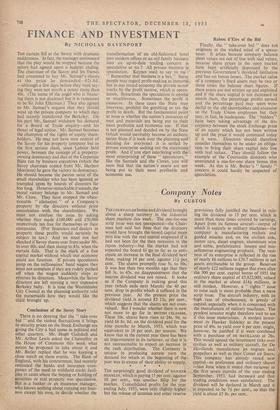FINANCE AND INVESTMENT
By NICHOLAS DAVENPORT THE curtain fell at the Savoy with dramatic suddenness. In fact, the manager announced that the play would be stopped because the actors had agreed upon a happier ending. The chairman' of the Savoy and his friends had consented to buy Mr. Samuel's shares at the price he demanded-62s.6d. —although a few days before they were say- ing they were not worth a penny more than 40s. (The name of the angel who is financ- ing them is not disclosed but it is rumoured to be Sir John Ellerman.) They also agreed to Mr. Samuel's request that they should wind up the private company to which they had secretly transferred the Berkeley. On his part Mr. Samuel withdrew his demand for a Board of Trade enquiry—and his threat of legal action. Mr. Samuel becomes the champion of the rights of equity share- holders. He may not have won control of the Savoy for his property company but in the first serious clash, since Labour held Power, between the concept of a property- owning democracy and that of the Corporate State run by business executives (which the Savoy chairman copied from Mr. Herbert Morrison) he gave the victory to democracy. He should become the patron saint of the small shareholder who has been ignored or trampled upon by boards of directors far too long. However remarkable it sounds, the moral victory belongs to Mr. Samuel and Mr. Clore. They have stopped the objec- tionable " alienation " of a Company's property by the directors without prior consultation with the shareholders. We must not confuse the issue by asking whether they made £100,000 and £50,000 respectively tax free for themselves or their companies. (For financiers and dealers in property these profits would certainly be subject to tax.) And we must not feel shocked if Savoy shares soar from under 30s. to over 60s. and then slump to 45s. when the curtain falls. That is the mark of a free capital market without which our economy could not function. If private speculators jump on the millionaires' band wagon they must not complain if they are rudely pushed off when the wagon suddenly stops or reverses its direction. Meanwhile the Savoy directors are left nursing a very expensive Berkeley baby. It is time the Westminster City Council as the planning authority told the nursemaids how they would like the child brought up.
Conclusions of the Savoy Story There is no denying that the " take-over bid " and the violent fluctuations it brings to security prices on the Stock Exchange are giving the City a bad name in political and other quarters. Mr. Hugh Gaitskell and Mr. Arthur Lewis asked the Chancellor in the House of Commons this week what action he proposed to take about it and Mr. Butler replied that he was keeping a close watch on these events. The Bank of England, with his concurrence, had recently reminded the banks and insurance com- panies of the need to withhold credit facil- ities in cases where the buying or holding of securities or real property was speculative. But is a banker or an insurance manager, who knows nothing about running any busi- ness except his own, to decide whether the transformation of an old-fashioned hotel into modern offices or an old family business into an up-to-date trading 'concern is speculative or no ? All private business is speculation. Keynes used to say to me : " Remember that business is a bet." Some people may regard profit-making as immoral but in our mixed economy the private sector works by the profit motive, which is specu- lation. Sometimes the speculation is unwise or mischievous. Sometimes the profit is excessive. In these cases the State may intervene, prohibit the gambling or tax the profit to death. But the fundamental point at issue is whether the nation's resources of men and materials are being put to their most profitable and economic use. if that is not planned and decided on by the State (which would inevitably become-an authori- tarian State if it took over the planning and deciding for everyone) it is settled by private enterprise seeking out the maximum profit. And if you start interfering with the most enterprising of these " speculators," like the Samuels and the Clores, you will soon find that the nation's assets are not being -put to their most profitable and economic use. Raison d 'Etre of the Bid Finally, the " take-over bid " does not originate in the wicked mind of a specu- lator. It arises because company balance sheet values are out of line with real values, because share prices in the open market have been artificially depressed by the previous Government's dividend limitation and ban on bonus issues. The market value of a company's fixed assets may be two or three times the balance sheet figures. If these assets are not written up and exploited and if the share capital is not increased to match them, the percentage profits earned and the percentage paid may seem won- derful to the old shareholders and excessive to the Trade Union employees but they may, in fact, be inadequate. The "bidders" have been taking advantage of the dis- crepancy between the stock Exchange price of an equity which has not been written up and the price it would command today if it were. Directors should therefore Consider themselves to be under an obliga- tion to bring their share capital into line with real values. They should follow the example of the Courtaulds directors who announced a one-for-one share bonus this week. As this is Mr. Butler's " family " concern it could hardly be suspected of speculation.










































 Previous page
Previous page